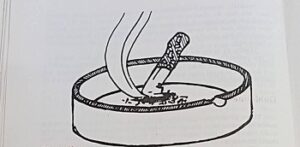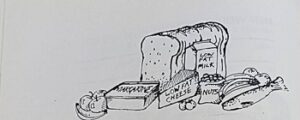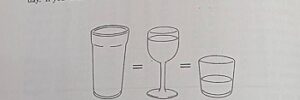First, remember that your risk depends on the combination of all the
risk factors mentioned above. Even if your blood pressure is slightly raised,
for example, your risk may be no more than average if most or all of the
other characteristics ar favourable. This conclusion applies especially to the
blood cholesterol level, which is receiving a lot of attention these days. It is
better for this to be low rather than high but you should not be unduly
concerned about a slightly or even moderately raised level if you do not
smoke and your blood pressure is normal. Secondly, remember that the chances of having a heart attack are very
much less than the chances of not having one during the next few years,
even if you are at higher than average risk. Try not to worry unduly. In fact,
most people find that knowing about their risk followed by ongoing efforts
to deal with this actually reduces the anxiety they may understandably feel
to begin with.
Thirdly, try to use the following guidelines, especially those that apply
to you personally, remembering-once again-that not smoking, avoiding
being overweight and taking exercise will make you feel better generally and
will help you to avoid other diseases too, such as lung cancer (in the case of
smoking), diabetes and gall-bladder trouble. Guidelines
These guidelines, separately or together, don’t guarantee complete
protection against heart attacks, but experience in many countries around the
world shows that they reduce the risk by a considerable amount. They
should be adopted by children and by parents on their behalf, as well as by
adults. They also apply to those who have had heart attacks in the past.Women
All these guidelines apply to women as well as men.
experience fewer heart attacks than men, particularly before the menopause
or “change of life”. Hormone replacement (HRT) treatment for menopausal
symptoms is increasing in use. In women who have had a hysterectomy
(removal of the uterus), HRT appears to reduce the risk of a heart attack. It
is still uncertain whether this also applies to the kind of HRT usually taken
by women who have not a hysterectomy.
Smoking
Avoiding smoking is probably the single most important step you can
take. Giving up (or not starting again) is much easier said than done.
Talking to friends or relatives who have stopped, joining anti-smoking
groups and discussing other measures with your general practitioner will
help you. Most people find that giving up altogether is easier than gradually
reducing the amount you smoke. Do not switch to cigars or a pipe.
Many people find that they put on weight when they have stopped
smoking. Try to avoid this if you can (See overleaf) but it is much more,
important to give up smoking.  Your diet
Your diet
It is probably an advice about diet that people find most confusing. There
are two reasons for changing your diet. One is to lose overweight. The other is
to reduce the blood cholesterol level. Contrary to general belief, there isn’t
much cholesterol in our food. It is the fat in your food, mainly from animal
sources, that influences your blood cholesterol level. The fat in your diet also
contains more calories than equivalent amounts of carbohydrate or protein, the
other main components of food. So by reducing thefat you take, you will help
to reduce your weight, if this is necessary, and also lower your blood cholesterol
level. Cream, full-cream milk, many a cheese, cakes and biscuits and fatty meat
are the main sources of fat in the diet: You can either try to alter your own diet
accordingly (and this is often easiest if the whole family takes part) or you can
discuss the best way with your family doctor. Besides reducing fat from daily
products, increasing the amount of oily fish and of certain oils used in cooking
are also helpful. Again, discuss these with your doctor, practice nurse or
hospital dietitian. (See end of this chapter about of some useful cookery books.)
Increase your intake of fresh fruit and vegetables, so that you are
taking 5 helpings in a day.  There is no particular need for you to reduce your sugar intake as far
There is no particular need for you to reduce your sugar intake as far
as heart attack risk is concerned. Sugar intake doesn’t appear to affect
gain in weight and so to an increased chance of developing diabetes and of
heart disease but don’t forget that excessive consumption may lead
aggravating arthritis.
to a
Nearly all of us take much more salt than we need, mostly in prepared foods
such as bread as well as by adding it during cooking or at the table. Reducing
your salt intake is particularly important if your blood pressure is raised.
Moderate alcohol consumption may give some protection against heart
alcohol, you should not change your habits. Men ought not to take more
attacks, but it is dangerous to drink too much. If you seldom or never drink
each correspond to one drink) and women should not take more than 2 drinks a
than 3 drinks a day (½ pint of beer, a glass of wine and a measure of spirit
day. If you do drink within these limits, there is no need for you to stop.  ½ pint of beer is approximately equivalent to a glass of
½ pint of beer is approximately equivalent to a glass of
wine or a simple measure of spirits.